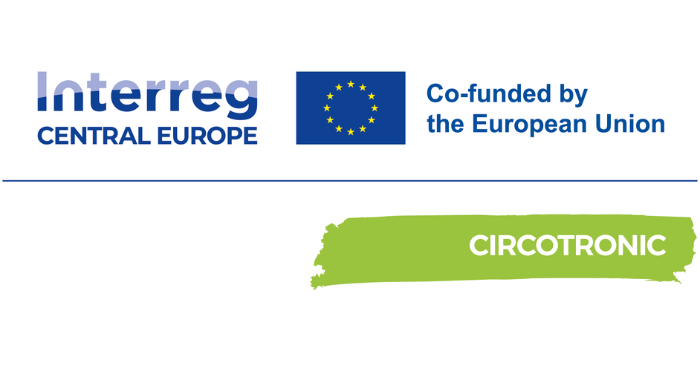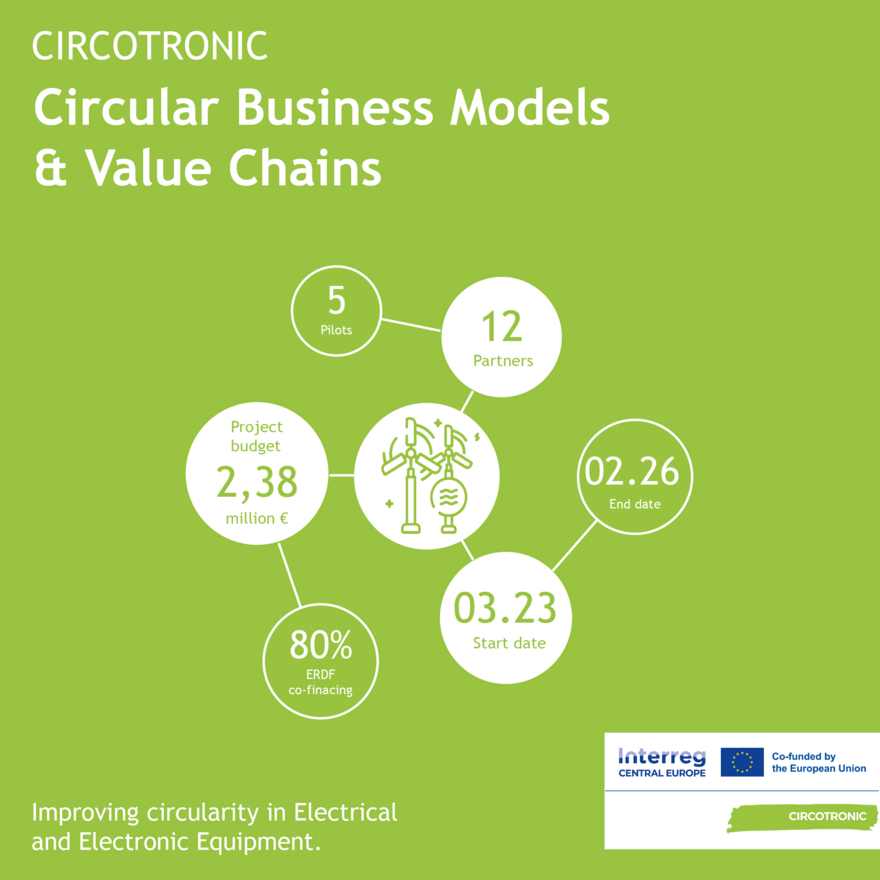
CIRCOTRONIC

EU Project CIRCOTRONIC: Improving Circularity in Electrical and Electronic Equipment
Nowadays we cannot imagine life without a smartphone or household appliances such as a vacuum cleaner or washing machine. The production of electrical and electronic equipment (EEE) is increasing rapidly. The production of rapidly increasing numbers of devices generates vast quantities of electronic waste and pollutes the environment, e.g. by water and soil contamination. In addition, the raw materials contained in EEE are often extracted under socially and ecologically questionable conditions.
Moreover, many electrical and electronic devices break down quickly and cannot be repaired easily or can only be repaired at high costs, sometimes owing to the lack of spare parts. As a result, many households have several defective devices that never or rarely make it to recycling.
According to recent estimates, out of a total of 100 million tons (mt) of electrical equipment in the EU, 90 mt are in active use in the household sector, whereas about 7 mt are unused even though they are functional and about 3 mt are defective (source: United Nations Institute for Training and Research, 2021). Further analysis shows that an additional 4 to 5 kg of unused electrical and electronic equipment is hoarded per EU citizen each year before it is disposed of (source: WEEE Forum website).
In order to address these problems and to support the EEE industry in its transition to circular value creation, the CIRCOTRONIC project brings together a total of 12 consortium partners from the fields of business support, science, politics, and regional development in Central Europe.
Together, they aim to establish a transnational network of regional circular laboratories and develop and test solutions for an improved circular economy in the electrical and electronics industry. The project focuses in particular on small and medium-sized enterprises (SMEs) in Central Europe and helps them to design their production processes more sustainably and in line with the circular economy by means of new concepts.
The focus lies on three main topics, namely 1) product design, 2) materials and recovery as well as 3) circular economy business models and value chains. The consortium shall use knowledge, tools, approaches and instruments already acquired in other projects and initiatives and adapt them for the EEE sector.
Another activity of CIRCOTRONIC is to develop, together with local and regional stakeholders, a transnational action plan with policy measures to implement the Circular Economy Action Plan 2020 (CEAP) in Central Europe in the EEE sector. The CEAP is one of the key building blocks of the European Green Deal. It promotes circular economy and sustainable consumption and ensures that resources built into products enter the material cycle in the EU and are not discarded as waste in other regions.
Project Objectives and Activities
The main objectives of the project are:
- to foster sustainable growth by transforming EEE manufacturing in Central Europe towards circular and resource-efficient processes, value chains, products and services, and minimising the negative impacts of EEE arising from material-use, pollutants and waste.
- Following a quadruple helic approach, CIRCOTRONIC aims to design a policy framework and implement circular economy policy measures supporting circular EEE manufacturing and the management of E-waste as a resource.
The three main work packages (WP) to implement the objectives are as follows:
- WP1: Circular Solutions for EEE-Product design and EEE- Value Chains.
- WP2: Establish a transnational network of Circular Labs for EEE.
- WP3: Policy measures for the implementation of the EU Circular Economy Action Plan in Central Europe.
Target Group
The project mainly addresses manufacturers and distributors of electrical and electronic equipment (especially SMEs) in Central Europe, universities, research and innovation institutes, recycling companies and associations, electrical trade associations, and environmental associations and NGOs.
BayFOR as a Partner
BayFOR as a project partner is involved in particular in WP 1 and WP 3. Together with the associated partners ECOLOGICON GmbH and the Professorship Circular Economy at the Technical University Munich Campus Straubing for Biotechnology and Sustainability, BayFOR takes an active role in elaborating measures for the implementation of the "Circular Economy Action Plan 2020" (CEAP). It supports (Bavarian) SMEs in the electrical and electronics industry in the transition from a linear to a circular economy by testing the tools, methods and approaches developed for this purpose.
BayFOR will also set up a virtual circular lab for EEE and shall contribute to a travelling exhibition on EEE to be displayed in Munich.
Funding Period
The CIRCOTRONIC project started on March 1st, 2023 and will run until February 2026, with a total project budget of just under 2.4 million euros and a project budget of 231,000 euros for Bavaria. The project receives 80 percent funding from the EU through the programme „Interreg Central Europe“.
Consortium
Under the coordination of the Slovenian Chamber of Commerce and Industry as the lead partner, 11 partners from Germany, Italy, Austria, Poland, Slovakia and Slovenia are active participants in the project. The BayFOR is the only German partner.
Coordinator: Chamber of Commerce and Industry of Slovenia, Slovenia
Slovenian Tool and Die Development Centre (TECOS), Slovenia
ELVEZ, Slovenia
Academy of Arts in Szczecin, Poland
Radex Zbigniew i Tomasz Nagay sp. j., Poland
Vienna University of Technology, Austria
Business Upper Austria, Austria
Bavarian Research Alliance (BayFOR) GmbH, Germany
Emilia-Romagna Region, Italy
t2i – Technology transfer and innovation, Italy
Technical University of Kosice, Slovakia
The Agency for the Support of Regional Development Košice, Slovakia
Further information
Project Factsheet
Poster: Mapping of e-waste value chain
Factsheet pilot action (German language)
Contact
Consortium Lead Partner
Grit Ackermann
Director, Chamber of Commerce and Industry of Slovenia
Project Cooperation Center
Phone.: +386 1 5898 418
Email: grit.ackermann@no-spam-pleasegzs.si
Contact at BayFOR

Natalia García Mozo
Head of Unit SME Advisory Services
Phone: +49 89 9901888-171
Email: mozo@no-spam-pleasebayfor.org

M. Sc. Nivedita Mahida-Königsdörfer
Scientific Officer SME Advisory Services
Phone: +49 89 9901888-175
Email: mahida@no-spam-pleasebayfor.org

M. A. Susanne Hirschmann
Scientific Officer Environment, Energy & Bioeconomy
Phone: +49 89 9901888-125
Email: hirschmann@no-spam-pleasebayfor.org





